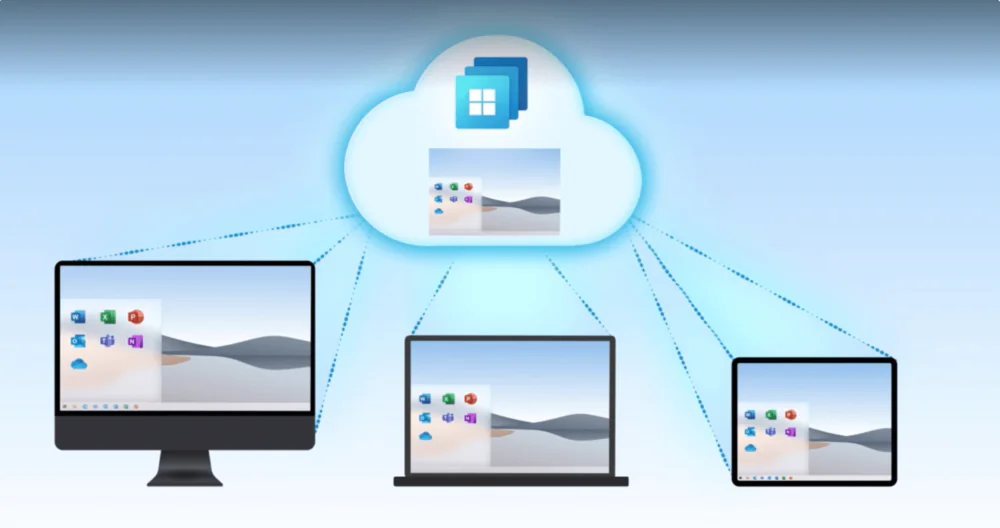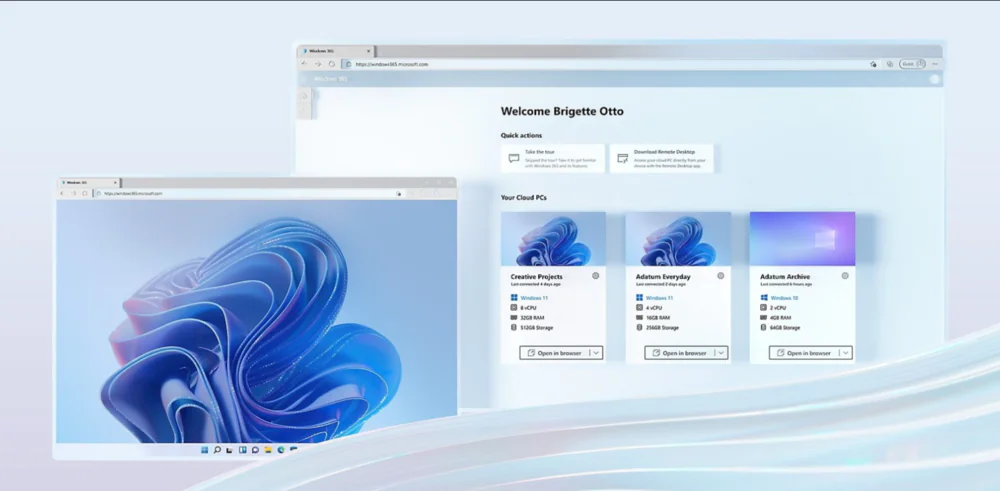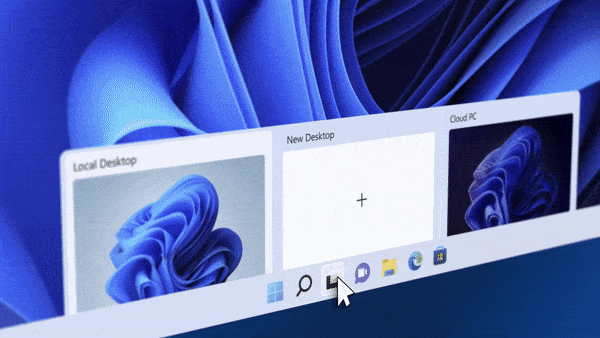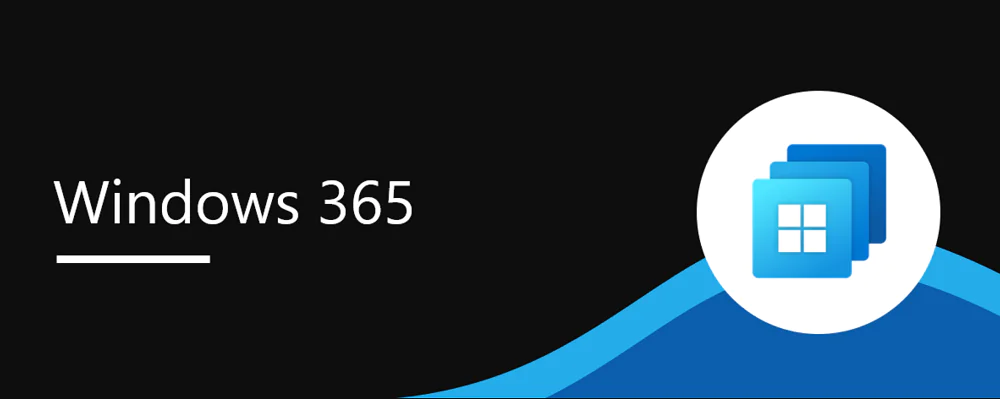© ROOT-NATION.com - Use of content is permitted with a backlink.
Will Microsoft abandon traditional Windows and move it to the cloud? I don’t really like this new approach, as in Windows 365.
Microsoft has repeatedly proved that it is not afraid of revolution. It has demonstrated this by investing millions of dollars in the development of artificial intelligence. Thanks to such bold steps, Copilot, an AI-powered assistant, will soon appear in Windows 11. Not to mention Bing AI based on ChatGPT. The American company is trying its best to be at the forefront of developments in the field of artificial intelligence algorithms.

We see other innovative changes in the Microsoft ecosystem, such as the Microsoft Cloud PC service, which has the potential to radically change the way we work on a computer. Indeed, this service has been available for some time now in the form of Windows 365, but only for business customers. Rumours, however, clearly indicate that sooner or later this solution will reach individual customers. I’m not sure about its usefulness, at least not in terms of universality. However, I can point out some advantages of the technology.
Read also: Everything you need to know about Microsoft’s Copilot
Windows 365 has been available for a long time
Cloud PC was intended to be a solution where software is a service. This is in line with Microsoft’s long-term plans to make elements of the company’s ecosystem available only online, through the cloud.

Windows 365 Cloud PC is a service that has been on the market since 2021 and is aimed at business customers. Its essence is to stream Windows without the need to install it on a computer. Everything is done using a well-functioning internet connection and the cloud.
Microsoft currently sells two types of services:
- Windows 365 Business – designed for small businesses and organisations without centralised IT management or IT staff. As a result, Windows 365 Business gives end users local administrator rights to their computers in the cloud. This is similar to what happens in many small businesses: users purchase a physical computer from a reseller and retain local administrator rights for that device.
- Windows 365 Enterprise is for large enterprises and specialised IT teams. It’s built on the management and security provided by Microsoft Endpoint Manager. Out of the box, all Windows 365 Enterprise cloud computers are registered with Microsoft Endpoint Manager with the ability to report Microsoft Defender antivirus alerts and enable full Microsoft Defender for Endpoint features.
Interestingly, Windows 11 is a system that is ideal for hybrid work, including in the cloud. Users can go to windows365.microsoft.com and manage their computers there. The possibilities offered by Windows 365 for the enterprise are a preview of what is to come.
Read also: What is CorePC – All about the new project from Microsoft
Computer as a service
For a long time, there were rumours that Windows 11 could become a cloud service for all users. Many experts say that Microsoft has come up with the idea of using the cloud for a new solution. This is quite easy to do, given the capabilities of Microsoft Azure. Microsoft has been working on this for a long time, as the development was based on Windows 10.
The idea behind the project is very simple. The company would sell very cheap computers, but with a cloud-based Windows system. Interestingly, there would also be advertising, which would reduce the price of the equipment on the market. This would be the company’s response to the increasingly popular Chromebooks. Already, these rumours have caused a wave of criticism (though they have not been confirmed), as not everyone likes the adverts. Observers have noted that users hate adverts, and that they will have to be connected to the Internet all the time. And this will probably involve small monthly payments, as in the case of Windows 365 for business. The guesswork doesn’t end there.

Many experts and Microsoft itself say that Windows 365 will soon be available to individual customers, i.e. ordinary Windows users. Users will be able to count on special packages for families, which may be cheaper. Of course, it will be a monthly subscription. There is even evidence that the service can cost at least $10 per month for the cheapest version and $20 for the advanced option. The price is not high, but are you ready to pay for Windows every month? Will we see another wave of “pirated” versions of Windows in the cloud?
Read also: Bluesky phenomenon: what is the service and how long will it last?
What awaits us in Windows 11 from the cloud?
In June of this year, one of Microsoft’s presentations stated that moving Windows 11 to the cloud was part of the company’s long-term strategy. The Redmond giant sees further developments in this area based on artificial intelligence (which is already happening) and “full roaming digital experience”.
Let me remind you that Windows 365 is a service that streams a full version of Windows to devices from the cloud. So far, access to it has been limited to commercial customers, but Microsoft has already deeply integrated it into Windows 11. An upcoming update will include Windows 365 Boot, which will allow Windows 11 devices to log directly into Cloud PC at boot time instead of the local version of Windows. Windows 365 Switch is also built into Windows 11 to integrate Cloud PCs into the task view (virtual desktops) feature.

The idea of fully moving Windows to the cloud for consumers is also presented alongside Microsoft’s need to invest in individual partnerships with ARM. Microsoft has done some of these for its ARM-based Surface Pro X devices.
To do so, Microsoft will have to slightly upgrade the current version of Windows 11, which should be able to download directly to Cloud PCs (via an internet connection) at launch. Rumour has it that one day Microsoft will want to move the Windows platform to the cloud entirely. Then you can expect that without an Internet connection, the computer simply won’t boot. However, this will require appropriate solutions that will not bother users if they do not have access to the Internet at the moment. After all, without it, the computer would be practically useless.

However, before taking such drastic measures, Microsoft will definitely introduce the Windows 365 consumer add-on service. What are the positive aspects of moving to the cloud? Here are some possible arguments:
- Much lower hardware requirements for a computer running Windows
- Fast and seamless system updates in the cloud
- Easier creation and management of profiles or family computers
- Improved security and monitoring of cyber threats
- Faster system startup and operation
- Microsoft online help.
Read alsо: What are 6G networks and why are they needed?
Are users ready for Windows 11 in the cloud?
There are more questions than answers here. Windows users have always been not very fond of big revolutionary changes. Let’s remember the failure of Windows Vista and Windows 8. They seemed to be relevant changes, but users did not accept them. Resources and nerves were spent, a lot of bad reviews were read, and the changes were abandoned.
The idea of an OS from the cloud may be good, but will users agree to pay for a subscription to Windows 365 in the cloud? I’m sure there will be a lot of noise. There will also be a lot of complaints about advertising, which is already abundant in our devices. However, Microsoft is no stranger to this.
Read also:
- Google Bard AI: everything you need to know
- All about the new MuWNS navigation system: Works underground and underwater

